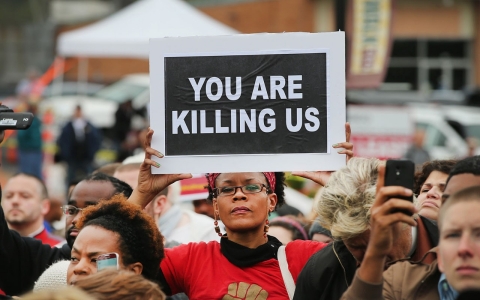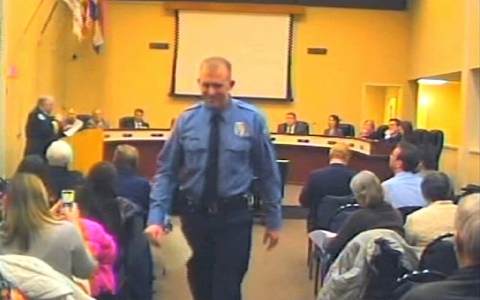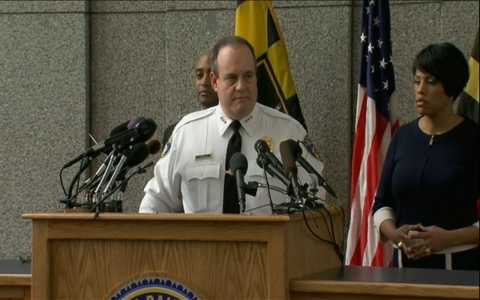Demonstrators briefly scuffled with police on Thursday evening during a protest over the death of a black man in Baltimore police custody.
The street action came as Police Commissioner Anthony Batts said Freddie Gray was not wearing a seatbelt while being transported in a police van to a station.
“He wasn't wearing a seatbelt and that's part of our investigation," said Batts who met with Gray’s family earlier on Thursday. "It's our responsibility to make sure people are safely transported, especially if their hands are behind their back."
Batts also said another man who was in the van during the end of Gray's ride told investigators that Gray was "was still moving around, that he was kicking and making noises" up until the van arrived at the station.
But Batts was careful to say that the investigation includes "everything the officers did that day."
Gray ran away and was captured on April 12 after an officer "made eye contact" with him outside a public housing complex, police said. Videos show Gray screaming on the ground before being dragged, his legs limp, into a van. Witnesses said he was crying out in pain.
The Gray family's lawyer, Billy Murphy said, "his spine was 80 percent severed" while in custody. It's not clear whether he was injured by officers in the street or while being carried alone in the van's compartment.
Gray died a week after he was arrested. A preliminary autopsy showed he died of a spinal cord injury.
Police brutality against prisoners being transported was addressed six months ago in a plan released by Baltimore officials. Department rules updated nine days before Gray's arrest clearly state that all detainees shall be strapped in by seat belts or "other authorized restraining devices" for their own safety after being arrested.
The directive came a decade after Dondi Johnson, who was arrested for urinating in public, died of a fractured spine after he was transported without a seat belt, with his hands cuffed behind his back. Attorney Kerry D. Staton obtained a $7.4 million judgment for Johnson’s family, later reduced to the legal cap of $200,000.
Thursday's march in the largely black city marked Gray’s death, which came at a time of national debation about the latest use of lethal force by police officers, especially against unarmed African-Americans in deadly encounters, including the fatal shooting of Michael Brown, an unarmed black 18-year-old in Ferguson, Missouri and the police chokehold death of a New York City man, Eric Gardner.
Two people were arrested, according to CBS Baltimore. Police commanders at the scene had no immediate word on the reason for the arrest during the march, and a police spokesman had no immediate comment.
Protesters stopped outside the office of the U.S. Attorney and Baltimore City State's Attorney Marilyn Mosby, who will determine whether charges will be brought against officers in the case.
Some protesters called for the six officers suspended in connection with the case to be charged with murder.
The Southern Christian Leadership Conference said it would independently investigate Gray's death, and the local head of the civil rights group said it lacked confidence in a police probe.
Police have said they will conclude their investigation by May 1 and turn results over to state prosecutors, followed by an independent review. The U.S. Department of Justice is conducting a separate probe.
Wire services

In the wake of Michael Brown's death, researchers say they can't find crucial data on police killings

Grand jury decision in Ferguson illustrates the legal and social barriers to prosecuting officers

Baltimore officials release video of arrest of Freddie Gray in effort to be transparent





Error
Sorry, your comment was not saved due to a technical problem. Please try again later or using a different browser.